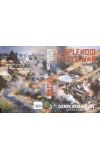
03 Apr 2014 09:56:10
The fighting didn't stop in 1918. There may have been an armistice then, but that didn't mean the trouble was over or that there weren't some restless soldiers still itching for a scrap. Particularly itchy were the pilots, who got easily bored. In this novel, one British airman flour-bombs the Brighton Express for a prank and hits the dining-car. "Few pilots had that kind of skill," muses an officer, reading the reports. "In the margin, the adjutant wrote: Jessop?" However, there was an almighty civil war going on in Russia, and in 1919, urged on by Winston Churchill, who wanted to "strangle Bolshevism in its cradle", the government secretly sent troops and materiel over to help the counter-revolutionary forces. This is the fourth and presumably final volume of Derek Robinson's RFC quartet, the one that began with Goshawk Squadron in 1971. The air force is now the RAF, but some characters remain from previous novels – those who either joined late and were lucky enough not to get shot down, or those who had desk jobs in the first place. Earlier novels made much of the disposability of newly qualified pilots; here, that is not a problem. The dangers in the Russia of 1919 are bad luck and disease. Bolshevik fighters – contemptuously called "Bolos" by the RAF – are not numerous, and easily spooked. The White Army pilots ranged against them are arguably more incompetent and cowardly, and all the imperialist generals are interested in are the massive, drunken dinner parties after their rare and improbable victories. "Russian hospitality is said to have failed if the guests can walk, unaided, to their carriages," one group of RAF officers is warned.
There are two interesting things about this novel. One is that its author was pushing 80 when he wrote it. I would normally consider it irrelevant – bad manners, even – to mention age, but when the writing is as crisp and fast as this, the humour as grim and good as ever, you have to salute the author.
The other interesting point is that this is not just an anti-gung-ho, illusion-stripping account of meaningless death in battle of the kind that Robinson has reliably produced so far. This is also, quietly, a historical novel that places its fighting in political context; we have scenes in which a secret advisory committee makes plans and briefs the PM as to events. (We get to meet Lloyd George by the end.) The airmen may know little and care less about the people they're fighting – which makes a point in itself – but the cynical realpolitik of the behind-the-scenes statesmen is enormously illuminating, shedding light even on the chaotic acts of war that Merlin squadron – as the RAF volunteers to Russia call themselves – engage in.
And here's another thing: while my first reading of the book provided an interesting perspective on the Russian character (on lying: "Russians can't stop themselves. There's a word for that kind of lying. We call it vranyo. It satisfies some inner need"), it was only on the most recent reading that I noticed, with a jolt, that the action takes place in Ukraine. This detail provides a certain contemporary piquancy. As for the location, not only are the endless Steppes superbly evoked, but we are given a sense of the region's volatility. Asked whether General Denikin of the White Russian army will capture Ukraine, a Russian count says: "I expect he'll capture some of it. Everyone does. Then they lose it. Fighting in the Ukraine is like filling a wheelbarrow with frogs. Anyone can do it but no one can keep the frogs in the wheelbarrow."
So, rather late in the day, Robinson has pulled off a remarkable coup. It's as briskly intelligent as anything he has done but he has also increased our historical understanding. The first and second world wars, where he has set most of his fiction before, are hardly closed books. This episode is, and we should thank him for helping to prise open its covers.

